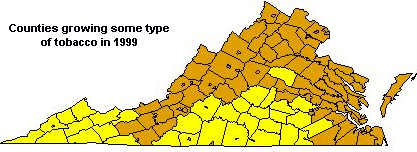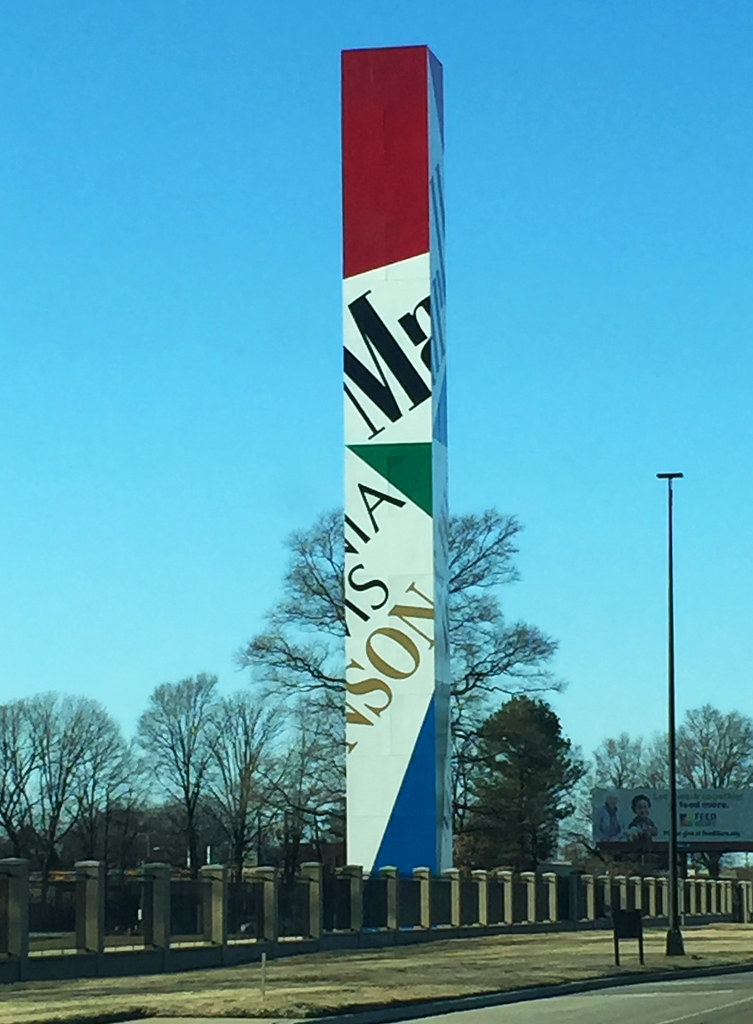A smoking ban in Virginia restaurants will begin in a few days, on December 1, 2009. Virginia does not allow standalone bars — an establishment must attribute a significant percentage of sales to food in order to maintain a liquor license — so the ban extends broadly and deeply across the state.
It includes several exemptions so it’s not the most stringent of bans possible, for example it allows smoking in separately ventilated spaces. Even so, the mere fact that it exists is itself remarkable. Think of Virginia and tobacco often comes to mind. The two are completely intertwined historically and culturally.
Significance of Tobacco in Virginia

Virginia is a tobacco state. This reaches back to the earliest days of its history when John Rolfe first cultivated tobacco in Jamestown, Virginia in 1612. That was just a few years after the initial English settlement of the North America colonies began and probably saved Jamestown itself. Thereafter tobacco dominated Virginia agricultural for more than three centuries.
Farmers still harvest tobacco in Virginia today primarily in the southern and southwestern parts of the state. Notice the two distinct yellow blobs on the map above. The Blue Ridge Mountains, a part of the Appalachians, separate the two primary tobacco growing regions. Bright or flue-cured tobacco dominates the region east of the Blue Ridge while burley grows to the west. There are two other types grown in Virginia, fire-cured and sun-cured, but in much smaller quantities. The crop came in at greater than 45 million pounds in 2008.
The Influence Wanes
What is less visible perhaps, and what makes the smoking ban a little more understandable, is the waning influence of tobacco in Virginia. Production has eroded steadily. The crop was nearly 90 million pounds ten years ago, or roughly double what it is today. Tobacco accounts for less than six percent of agricultural cash receipts in the state currently, and five other commodities produce greater revenue.
Naturally the Virginia economy is much larger than agriculture alone. The northern part of the state in particular continues to boom in population, and those new residents are not farmers. Tobacco, once emblematic and iconic of Virginia, now fades into the background.
However, tobacco isn’t dead in Virginia and the industry does continue to maintain a degree of power and influence. Of the several exceptions contained in the ban, I found one particularly quirky: “any restaurant located on the premises of any manufacturer of tobacco products” is specifically exempted. So any smoker fortunate enough to work for a tobacco manufacturer can continue to puff away in the company cafeteria.
Philip Morris

I wondered how often that might actually happen so I went to the maps. Long ago I used to drive the length of Interstate 95 through Virginia quite frequently. During those days I could sometimes detect the faint smell of tobacco in the area south of Richmond. This wasn’t burning tobacco or cigarette smoke, but rather the sweet smell of tobacco going through the manufacturing process. It’s a smell I suppose one either loves or hates — I rather enjoyed it — but it’s difficult to miss as one passes through this section of the Interstate. The smell reveals itself before one actually sees the cigarette logo spire in front of the massive Richmond Manufacturing Center of the Philip Morris company (map).
Every day they produce 600 million cigarettes on their two-hundred acre site. They also have facilities in nearby Chester adjacent to the historic Bermuda Hundred, and in York near Williamsburg. I am going to guess that each of those is probably large enough to have an on-site dining facility that’s exempt from the ban.
Smaller Manufacturers
I figured Philip Morris was the main beneficiary of the exception but I wondered if there might be others. I’m not a smoker so I’ve never delved into this world before. Nonetheless, I found that there are actually a fair number of resources available to try to determine an answer. I looked at the U.S. Tobacco Cooperative website. I also found a great page on Google Answers dealing with small, independent U.S. Cigarette Manufacturers. There are probably a number of places in Virginia where the exception applies.
S&M Brands
[EDITOR’S NOTE: S&M Brands was sold in March 2019 and ceased operations. The information in this section is no longer accurate]
S&M Brands Inc., a small family-owned company, produces cigarettes under the Bailey’s name just outside of Keysville, Virginia. I managed to find it on a map without too much difficulty and produced the Street View image displayed above. This facility looks large enough to possibly have on-site dining. I don’t know — maybe someone from Bailey’s will find this article someday and set the record straight.
Bailey’s is a boutique brand of high-quality cigarettes. Until I started researching this post I never knew such a thing existed, and I’d always just thought of monolithic Big Tobacco. I guess it’s not that much different from the microbrewery movement I’ve been following closely for a number of years, or the small-batch bourbon whiskey revolution for that matter. I’m not going to get all judgmental as to whether someone should partake or not. Frankly I don’t care as long as I don’t have to breath-in someone else’s second hand smoke. We all make our own choices and select our own vices, and in that context perhaps a certain level of quality makes sense.
Cherokee Tobacco
I found another possible candidate where the exception might exist. Cherokee Tobacco is located at the South Boston Industrial Park in Halifax County, Virginia. I tried to find it on Street View, and hunted all through that industrial park, but I’ll be darned if I could see it. Maybe you’ll have more luck.
Before I close this out I wanted to mention one other thing. Naturally, we all use Wikipedia regularly. However I’d imagine few of us have encountered a wiki known as Cigarettespedia. I mention it primarily because I liked its logo. Rather than a globe as a jigsaw puzzle it’s a cigarette box.

Leave a Reply